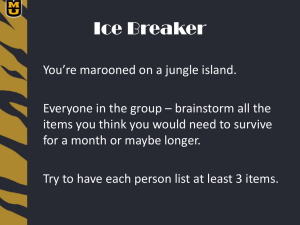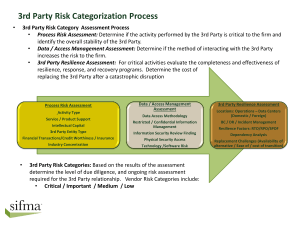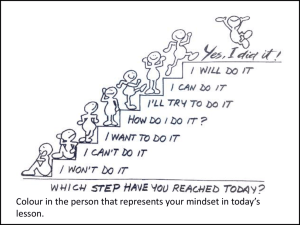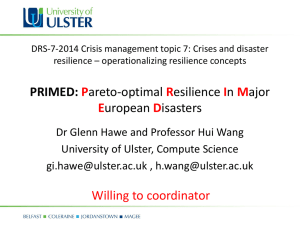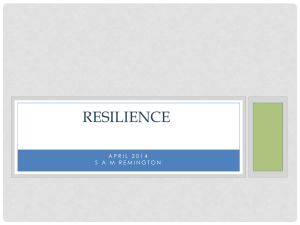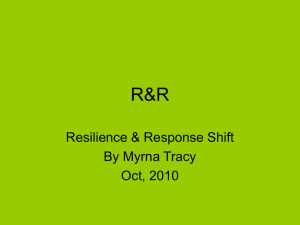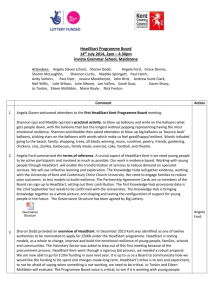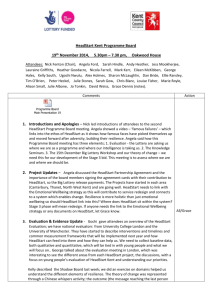23.09.2014 Minutes
advertisement
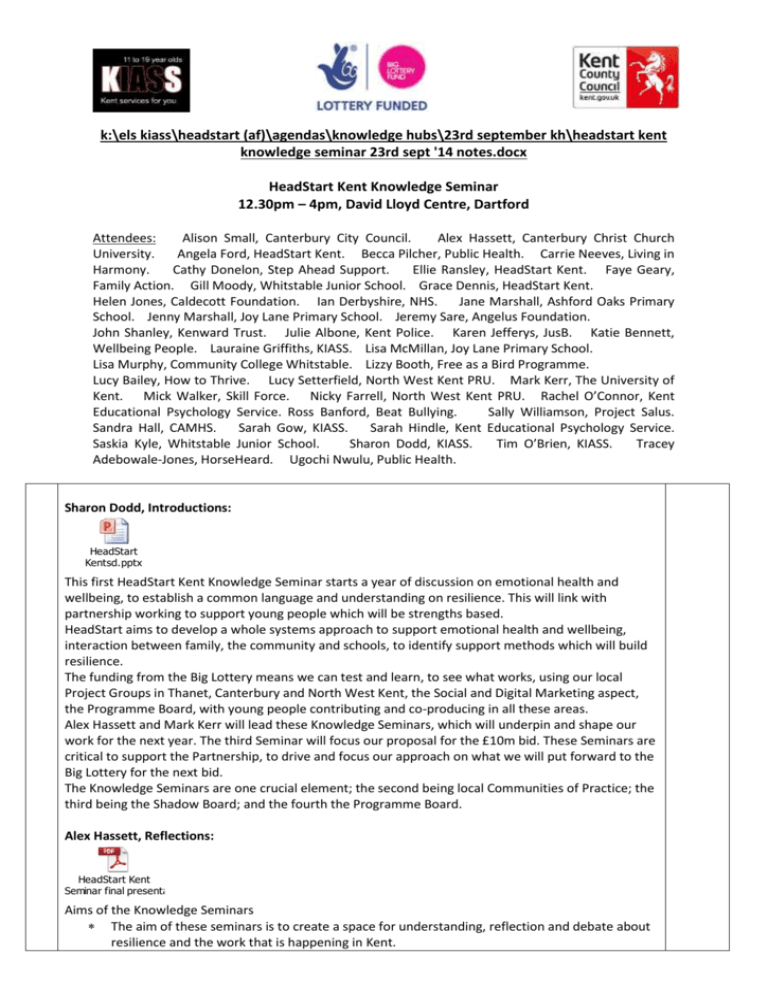
k:\els kiass\headstart (af)\agendas\knowledge hubs\23rd september kh\headstart kent knowledge seminar 23rd sept '14 notes.docx HeadStart Kent Knowledge Seminar 12.30pm – 4pm, David Lloyd Centre, Dartford Attendees: Alison Small, Canterbury City Council. Alex Hassett, Canterbury Christ Church University. Angela Ford, HeadStart Kent. Becca Pilcher, Public Health. Carrie Neeves, Living in Harmony. Cathy Donelon, Step Ahead Support. Ellie Ransley, HeadStart Kent. Faye Geary, Family Action. Gill Moody, Whitstable Junior School. Grace Dennis, HeadStart Kent. Helen Jones, Caldecott Foundation. Ian Derbyshire, NHS. Jane Marshall, Ashford Oaks Primary School. Jenny Marshall, Joy Lane Primary School. Jeremy Sare, Angelus Foundation. John Shanley, Kenward Trust. Julie Albone, Kent Police. Karen Jefferys, JusB. Katie Bennett, Wellbeing People. Lauraine Griffiths, KIASS. Lisa McMillan, Joy Lane Primary School. Lisa Murphy, Community College Whitstable. Lizzy Booth, Free as a Bird Programme. Lucy Bailey, How to Thrive. Lucy Setterfield, North West Kent PRU. Mark Kerr, The University of Kent. Mick Walker, Skill Force. Nicky Farrell, North West Kent PRU. Rachel O’Connor, Kent Educational Psychology Service. Ross Banford, Beat Bullying. Sally Williamson, Project Salus. Sandra Hall, CAMHS. Sarah Gow, KIASS. Sarah Hindle, Kent Educational Psychology Service. Saskia Kyle, Whitstable Junior School. Sharon Dodd, KIASS. Tim O’Brien, KIASS. Tracey Adebowale-Jones, HorseHeard. Ugochi Nwulu, Public Health. Sharon Dodd, Introductions: HeadStart Kentsd.pptx This first HeadStart Kent Knowledge Seminar starts a year of discussion on emotional health and wellbeing, to establish a common language and understanding on resilience. This will link with partnership working to support young people which will be strengths based. HeadStart aims to develop a whole systems approach to support emotional health and wellbeing, interaction between family, the community and schools, to identify support methods which will build resilience. The funding from the Big Lottery means we can test and learn, to see what works, using our local Project Groups in Thanet, Canterbury and North West Kent, the Social and Digital Marketing aspect, the Programme Board, with young people contributing and co-producing in all these areas. Alex Hassett and Mark Kerr will lead these Knowledge Seminars, which will underpin and shape our work for the next year. The third Seminar will focus our proposal for the £10m bid. These Seminars are critical to support the Partnership, to drive and focus our approach on what we will put forward to the Big Lottery for the next bid. The Knowledge Seminars are one crucial element; the second being local Communities of Practice; the third being the Shadow Board; and the fourth the Programme Board. Alex Hassett, Reflections: HeadStart Kent Seminar final presentation.pdf Aims of the Knowledge Seminars The aim of these seminars is to create a space for understanding, reflection and debate about resilience and the work that is happening in Kent. These discussions will be based on a theoretical understanding of the concept and evidence based research. This learning will ultimately lead to a bid being developed to continue the Headstart work. This first Seminar will be used so delegates can reflect and think about their understanding of resilience, which will be fed back to the Community of Practice. How do the definitions on what resilience is from the Big Lottery and from young people fit? How does our work fit into resilience? Agreed Definition of Resilience for this programme is that used by the BIG Lottery: “Emotional resilience; the opportunity for and capacity of young people – in the context of adversity - to negotiate for and navigate their own way to resources that sustain their mental health” Young people’s definition of Resilience: “Ability to be mentally strong enough to bounce back from the problems in life” Mark Kerr, Conceptualising Resilience The aim of the first seminar was to build a shared definition of resilience. Mark Kerr, provided psychological input regarding definitions for resilience; for example, using Grotberg’s 1997 definition that resilient individuals can say: I HAVE… people I can trust and love I AM … a loveable person I CAN… find ways to solve problems Resilience has been defined as the ability to face adversity, to deal with risk and avoid negative consequences (Luthar, 2005) (Gilligan, 1997). It has been argued that when a young person experiences diversity, this results in resilience. It is the interaction between factors, rather than a specific trait, which leads to resilience (Grotberg 1997). Barnardos have researched resilience, and Daniel et al. 1999, Newman and Blackburn 2002 and Sally Wassell have all written on the subject of resilience. Mark also shared ecological models of resilience exploring the impact of family, school and peers (Daniel and Wassell, 2002) and referred to the work of Rutter, looking at differences in factors supporting resilience in infants, children and adolescents. Mechanisms are needed for young people to sustain resilience themselves. In the literature, risk factors have been identified as a high risk and healthy ecology and 3 building blocks of resilience: 1. A secure base / security / attachment. 2. Self-esteem. 3. Self-efficacy. Resilience strings are linked to each other: a secure base, education, friendships, talents and interests, positive values and social competencies. Resilience factors vary in infancy, throughout school and during adolescence. Even simple activities are said to support resilience, they are protective factors. Ungar (2011) described the capacity of individuals to navigate and sustain wellbeing and negotiate support resulted in pathways and asking for help. There is no known resilience measure, however the resilience strings help us measure more collectively. Resilience is always being re-refined and re-worked as more research is conducted. Sharon Dodd said that we can measure the impact through these common frameworks on what resilience is to start an evidence based practice. We will be working with Public Health to achieve this. Mark Kerr offered to provide literature to delegates depending on what practical work they are doing with young people. Rachel O’Connor (from Kent Educational Psychology Services) summarised the outcomes of the discussion as follows Feedback collected during the seminar suggested that participants consider resilience to be an interaction of a number of factors which change as the child gets older. Education Friendship Talents and Interests Positive values Secure base Social competence Seminar participants concluded that it is helpful to consider the impact of resilience in six different domains: Within these domains impact should be considered in terms of the individual, family and community. Feedback from the discussion groups highlighted concerns about achieving coherence across services and projects and considered whether the above domain model could be used to support this coherence and consistency in evaluation. Alex Hassett, Ideas Workshop and Gathering the Knowledge Alex asked delegates for ideas for the next seminars. 1. What is the bigger picture on resilience? How can we deliver PRP? Angela Ford said about the PRP training that will be delivered in Kent in December and in Hertfordshire in November. 2. What are the bench marks for the different projects? What is the context? How can we measure impact? Sharon Dodd reiterated that there will be an evaluation framework which all HeadStart schools will use and these will be the same as the Public Health evaluators. 3. Should we have a domain approach and what are the tools to implement this? How do we measure the impact? What are the other evidence based projects and how are they tied together? What is HeadStart doing in the other areas? 4. How will we sustain the good work? 10-14 years old is very specific and transition is key, we need parent involvement. Sharon Dodd said HeadStart Kent has been written into the new Kent Policy on emotional health. 5. How will HeadStart affect the transition between specialist and targeted services, how can we work together to link short term services and longer term ones? 6. How are we going to control HeadStart, do young people and parents need to accept responsibility too? 7. How is resilience measured? 8. If the funding is reliant on outcomes, how do we show outcomes in this type of work? 9. What will our exit strategy be? 10. How are young people involved? Angela Ford discussed the young people’s Shadow Boards we are holding. A decision was made that evaluation and measuring outcomes of resilience work would be the focus of the next knowledge seminar. Ugochi Nwulu, Evaluation HeadStart Kowledge Hub evalaution presentation slides_U Nwulu_23-09-14.pptx


